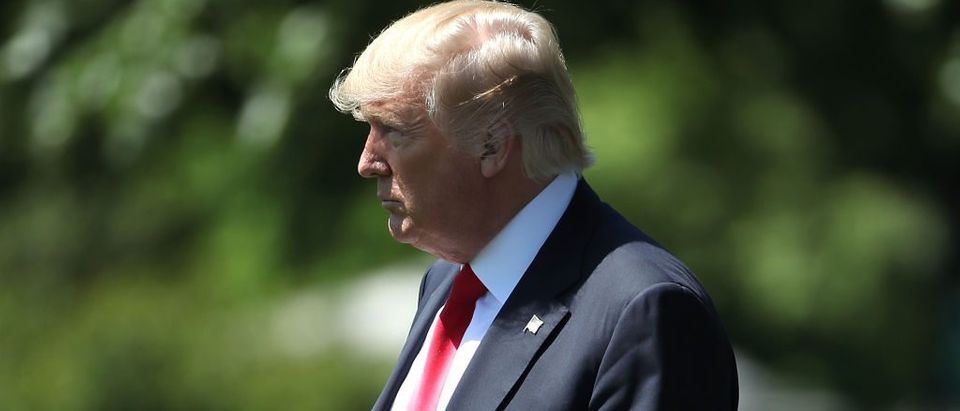Occasionally, a dragonfly makes it out of the Swamp to arc across the sky, where, shimmering, it can still be seen.
Trump:
I mean, had Andrew Jackson been a little later you wouldn’t have had the Civil War,” President Trump said to the Washington Examiner. “He was a very tough person but he had a big heart. He was really angry that he saw what was happening with regard to the Civil War, he said ‘There’s no reason for this.’
People don’t realize, you know, the Civil War, if you think about it, why? People don’t ask that question, but why was there the Civil War? Why could that one not have been worked out?
And the PhDs of the nation convulsed; frothing, they waited for the inevitable media pings that would permit them to unleash their Dogs of Knowledge against such indefensible Foolishness….
[S]lavery was so deeply entrenched that Lincoln was sucked into a four-year civil war. The deaths of 750,000 Americans was the tragic price of abolishing slavery and opening the way to civil rights (Reynolds, CCNY) …
Not only did Jackson die long before Civil War started, which makes the entire debate purely speculative … particularly loaded when clumsily connected to the question of who or what could have “saved” the nation from the Civil War (Zelizer, Princeton) …
If it reflects anything, it reflects a kind of great man idea of history, that if you just have the right man with the right strength you can change the course of history. And that is nonsense (Blight, Yale)…
He starts from the wrong premise — the premise that the Civil War should somehow have been avoided, and that someone more skilled on the White House could have avoided it (Grossman, American Historical Association)…
In other words, it took just one revolution of a news cycle to show how stale, hoary and fatalistic this brand of Knowledge is. Mainly, it is inviolable and not to be questioned, more like a kind of retrospective augury, interpreting omens and signs, rather than learning and teaching.
And so … the lives of (over) 750,000 Americans was “the tragic price” of slavery. It is “nonsense” to think that any other sequence of events was possible, or that any other historical actor(s) could have ” `saved’ the nation.” Most of all, though, Trump’s “premise” that the Civil War should have been avoided in the first place is “wrong.”
Grossman, Jacobin-like, continued:
If one sees the Civil War as a war of liberation, which is what it was, then it shouldn’t have been avoided.
I wonder if the PhD would put it quite that way while lying across a kitchen table in what remained of either uniform, soaked in his own bodily fluids, the last of the chloroform gone, not yet passed out from the pain, nauseous from the sound of his gangrenous leg being sawn off at the hip …
More Grossman:
Had you compromised out the differences between the government and the confederacy, or between anti-slavery forces and southern slaveholders, the victims would have been the enslaved people of the south.
There is just no other way to emancipation imaginable. Just to be clear…
Could the problem of slavery have been solved without a war? Scholars have answered that with a firm no, that slavery wouldn’t have ended on its own (Giesberg, Villanova).
Never mind that “ending on its own” is not a part of Trump’s rhetorical question.
What becomes clear from this skirmish is how such scholars have turned our contemplation of history from the study of human beings — their failings, heroics, venalities, triumphs, etc. — into the study of game pieces, or, better, ball bearings, following a track of these experts’ design.
Following the track of 21st century scholarship, then, the Civil War was undeviatingly inevitable and rightly so. Fie on the 45th POTUS for musing otherwise.
Most notably, President Trump did was what Candidate Trump did all the time: He exposed another taboo; in this case, the taboo of questioning history that must remain unquestioned. We must not question whether there might have been a better man, a better way to avoid the worst calamity in American history.
The numerical losses only begin to tell the story: Military deaths of as many as 750,000 men, according to new research, including some 40,000 black soldiers who died during the war, 30,000 of infection or disease; tens of thousands of civilians, also, who perished.
Drew Gilpin Faust writes:
The distinguished Civil War historian James McPherson has estimated that there were 50,000 civilian deaths during the war, and has concluded that the overall mortality rate for the South exceeded that of any country in World War I and all but the region between the Rhine and the Volga in World War II. The American Civil War produced carnage that was often thought to be reserved for the combination of technological proficiency and inhumanity characteristic of a later time.
Heretofore unthinkable devastation, too.
But all of this and so much, much more calamity was inevitable and rightly so (and that has to include the suffering en masse of freed slaves following the end of the fighting), according to the credentialed ones arrayed against Trump. (An exception well worth reading is here.). The orthodoxy-and-
There is a larger lesson here. So long as such doctrinaire thinking prevails among professional historians, they will continue to ruin history’s most precious legacy: The ability to learn from the past.












